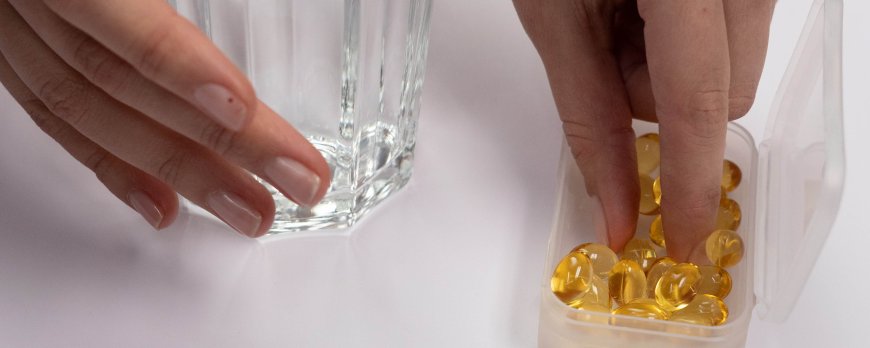Does vitamin D3 help with joint pain?
Uncover the connection between Vitamin D3 intake and joint pain relief. Does Vitamin D3 help with joint pain? Explore this crucial health question now.

Does Vitamin D3 Help with Joint Pain?
Vitamin D3 has been the subject of much interest and research when it comes to its potential to alleviate joint pain. While the role of vitamin D3 in relieving joint pain, particularly in cases of inflammation, is not fully understood and requires further research, there is evidence to suggest that vitamin D plays a crucial role in bone health and may have anti-inflammatory effects.
When the body lacks sufficient vitamin D, it can lead to symptoms such as joint, muscle, and bone pain. Some studies have also shown a connection between vitamin D deficiency and conditions like rheumatoid arthritis (RA), although the evidence is not yet conclusive.
Getting enough vitamin D can be achieved through sunlight exposure and certain foods, but supplements may be necessary for individuals who have difficulty meeting their vitamin D needs. Additionally, other nutrients such as probiotics, omega-3 fatty acids, calcium, and vitamin K have also been suggested to help relieve joint pain. Following a Mediterranean diet and consuming foods rich in antioxidants can contribute to overall joint health.
Key Takeaways:
- Vitamin D3 has potential benefits in reducing joint pain, but more research is needed.
- Vitamin D deficiency can result in joint, muscle, and bone pain.
- Studies have shown a possible link between vitamin D deficiency and rheumatoid arthritis.
- Supplements may be necessary for those who struggle to obtain sufficient vitamin D through sunlight and diet.
- Other nutrients like probiotics, omega-3 fatty acids, calcium, and vitamin K may also play a role in joint pain relief.
- Following a Mediterranean diet and consuming antioxidant-rich foods can support joint health.

The Importance of Vitamin D3 for Joint Health
Adequate levels of vitamin D3 play a crucial role in the overall health and function of our joints. Vitamin D3, also known as the "sunshine vitamin," is essential for maintaining strong bones and may also have anti-inflammatory effects. Though the exact connection between vitamin D3 and joint health is still being studied, research suggests that vitamin D deficiency can contribute to symptoms such as joint, muscle, and bone pain.
Vitamin D3 deficiency has been linked to various chronic pain conditions, including rheumatoid arthritis (RA). However, it is important to note that while some studies have shown an association between vitamin D deficiency and RA, a large-scale study has concluded that the evidence is not strong enough to establish a definitive link. More research is needed to fully understand the role of vitamin D3 in these conditions.
In order to maintain optimal levels of vitamin D3, it is recommended to obtain it through sunlight exposure and certain foods fortified with this vital nutrient. However, for individuals who have difficulty getting enough vitamin D3, supplements may be necessary. It is advisable to consult with a healthcare professional for guidance on the appropriate dosage and duration of supplementation.
Other Nutrients for Joint Pain Relief
In addition to vitamin D3, other nutrients can also help alleviate joint pain and promote overall joint health. Probiotics, omega-3 fatty acids, calcium, and vitamin K are among the nutrients that have shown potential benefits in this regard. Probiotics can help reduce inflammation and improve gut health, which is linked to joint health. Omega-3 fatty acids have anti-inflammatory properties and may help reduce joint pain and stiffness. Calcium and vitamin K are important for bone health and play a role in maintaining strong and healthy joints.
It is worth noting that maintaining a healthy diet can also contribute to joint health. Following a Mediterranean diet, which emphasizes fruits, vegetables, whole grains, lean proteins, and healthy fats, has been associated with reduced inflammation and improved joint function. Including foods rich in antioxidants, such as berries, leafy greens, and nuts, can also help support overall joint health and reduce inflammation.
The Link Between Vitamin D3 Deficiency and Joint Pain
Research suggests that vitamin D3 deficiency may contribute to joint pain, especially in individuals with arthritis. Vitamin D, also known as the sunshine vitamin, plays a crucial role in maintaining bone health and may have anti-inflammatory effects. When the body lacks sufficient vitamin D3, it can lead to symptoms such as joint, muscle, and bone pain.
A number of studies have investigated the relationship between vitamin D3 deficiency and rheumatoid arthritis (RA), a chronic autoimmune condition known for causing joint pain. While some studies have shown a potential link between vitamin D3 levels and RA-related joint pain, a large-scale study concluded that the evidence is not strong enough to establish a definitive connection between vitamin D3 deficiency and chronic pain conditions like RA.
Exploring Vitamin D3 Supplementation
In cases where vitamin D3 deficiency is suspected or diagnosed, supplementation may be necessary to ensure optimal levels. Vitamin D3 supplements are available in various forms, including capsules, tablets, and drops. It is important to consult with a healthcare professional to determine the appropriate dosage for individual needs.
Other Nutrients for Joint Pain Relief
In addition to vitamin D3, other nutrients have been identified for their potential role in relieving joint pain. Probiotics, omega-3 fatty acids, calcium, and vitamin K are among the nutrients that may provide benefits for joint health. Probiotics promote a healthy gut microbiome, which has been linked to reduced inflammation in the body. Omega-3 fatty acids, found in fatty fish like salmon, can have anti-inflammatory effects. Calcium and vitamin K are essential for bone health, which indirectly supports joint health.
In conclusion, while research suggests that vitamin D3 deficiency may contribute to joint pain, particularly in cases of arthritis, the definitive link is still unclear. Supplementation may be necessary for those with inadequate vitamin D3 levels, but it is important to consult with a healthcare professional for personalized guidance. Additionally, incorporating other nutrients and following a healthy diet can support overall joint health and potentially alleviate joint pain.

Vitamin D3 and Inflammation
Vitamin D3 may exert anti-inflammatory effects that could help alleviate joint pain associated with inflammation. Inflammation is a common occurrence in conditions like rheumatoid arthritis (RA) and can contribute to joint discomfort and stiffness. While the exact mechanisms of how vitamin D3 interacts with inflammation are still being studied, research suggests that adequate levels of vitamin D3 may help modulate the immune response and reduce inflammation in the body.
In addition to its potential anti-inflammatory properties, vitamin D3 plays a crucial role in maintaining overall joint health. It aids in the absorption and utilization of calcium, which is essential for bone strength and integrity. By promoting proper bone health, vitamin D3 indirectly supports joint function and may contribute to reducing joint pain.
Ways to Obtain Vitamin D3
The primary source of vitamin D3 is sunlight exposure. When ultraviolet (UV) rays from the sun come into contact with the skin, they trigger the synthesis of vitamin D3. Spending a few minutes outdoors each day, particularly during the sun's peak hours, can help maintain adequate vitamin D levels.
However, depending on factors such as geography, season, and lifestyle, it may be challenging to obtain sufficient vitamin D3 from sunlight alone. In such cases, dietary sources and supplementation can be beneficial. Foods like fatty fish (salmon, mackerel), fortified milk and orange juice, and egg yolks are natural sources of vitamin D3. Additionally, vitamin D3 supplements are available over-the-counter and can help ensure optimal intake.
It's important to note that as with any supplement, it's best to consult with a healthcare professional to determine the appropriate dosage for individual needs. They can assess vitamin D levels through blood tests and provide personalized recommendations.
In conclusion, while further research is needed to fully understand the relationship between vitamin D3 and joint inflammation, it is evident that vitamin D3 plays a vital role in overall joint health. Adequate intake of vitamin D3, whether through sunlight exposure, dietary sources, or supplementation, may help promote joint health and potentially alleviate joint pain associated with inflammation.
The Role of Vitamin D3 in Rheumatoid Arthritis
Studies have suggested a potential association between vitamin D3 and the management of joint pain in individuals with rheumatoid arthritis. Rheumatoid arthritis is a chronic autoimmune disease that causes inflammation in the joints, leading to pain, swelling, and stiffness. While the exact mechanisms are still being studied, vitamin D3 has shown promise in potentially reducing joint pain and inflammation associated with this condition.
Vitamin D3 plays a crucial role in maintaining bone health and regulating the immune system. It helps the body absorb calcium, promoting strong bones and preventing conditions like osteoporosis. Additionally, vitamin D3 has anti-inflammatory effects, which may be particularly beneficial for individuals with rheumatoid arthritis, as inflammation is a key feature of the disease.
The Potential Benefits of Vitamin D3 Supplementation
- Reduced inflammation: Vitamin D3 has been shown to have anti-inflammatory effects, which may help alleviate joint pain and swelling in individuals with rheumatoid arthritis.
- Bone health: Vitamin D3 plays a vital role in calcium absorption, which is essential for maintaining strong bones. This can be particularly important for individuals with rheumatoid arthritis, as the disease can increase the risk of bone loss.
- Immune system modulation: Rheumatoid arthritis is an autoimmune disease, in which the immune system mistakenly attacks the body's own tissues. Vitamin D3 has immunomodulatory properties, which means it can help regulate the immune system and potentially reduce the autoimmune response seen in rheumatoid arthritis.
While further research is needed to fully understand the role of vitamin D3 in managing joint pain in individuals with rheumatoid arthritis, incorporating adequate levels of vitamin D3 through supplementation or sunlight exposure may be beneficial. It is always advisable to consult with a healthcare professional before starting any new supplementation regimen, especially for individuals with specific medical conditions.

Obtaining Vitamin D3 and Joint Pain Relief
Vitamin D3 can be obtained through different sources, and ensuring sufficient intake may contribute to joint pain relief. Here are some ways to incorporate vitamin D3 into your routine:
- Sunlight Exposure: Spending time outdoors in the sun can stimulate your body to produce vitamin D3. Aim for 10-30 minutes of sun exposure, preferably during the midday when the sun's rays are the strongest.
- Dietary Intake: Some foods naturally contain vitamin D3, such as fatty fish (salmon, mackerel), egg yolks, and fortified dairy products. Including these foods in your diet can help boost your vitamin D3 levels.
- Supplements: If you have difficulty getting enough vitamin D3 from sunlight and diet alone, supplements can be a convenient option. Consult with your healthcare provider to determine the appropriate dosage for your specific needs.
While vitamin D3 may play a role in joint pain relief, it's important to note that individual results may vary. It's always best to consult with a healthcare professional before making any significant changes to your supplementation or treatment regimen. They can assess your specific situation and provide personalized recommendations.
In addition to vitamin D3, there are other nutrients that may help alleviate joint pain. Probiotics, omega-3 fatty acids, calcium, and vitamin K have all been studied for their potential benefits in promoting joint health. Incorporating these nutrients into your diet, either through food sources or supplements, may complement the effects of vitamin D3 and contribute to overall joint pain relief.
Other Nutrients for Joint Pain Relief
While vitamin D3 is important for joint health, other nutrients should also be considered for comprehensive joint pain relief. These nutrients offer additional benefits and can work synergistically with vitamin D3 to support overall joint health. Here are some key nutrients to incorporate into your diet:
- Probiotics: Probiotics, such as those found in yogurt or fermented foods, can help reduce inflammation in the body. They promote a healthy gut microbiome, which in turn supports a balanced immune response and may help alleviate joint pain.
- Omega-3 Fatty Acids: Found in fatty fish like salmon and mackerel, as well as in walnuts and flaxseeds, omega-3 fatty acids have anti-inflammatory properties. They can help reduce joint pain and stiffness by decreasing inflammation in the body.
- Calcium: Calcium is essential for maintaining healthy bones and preventing conditions such as osteoporosis. Adequate calcium intake can support strong joints and alleviate joint pain. Good sources of calcium include milk, cheese, yogurt, and leafy green vegetables.
- Vitamin K: Vitamin K is necessary for proper bone health and is involved in the body's natural blood clotting process. It can help reduce joint inflammation and support overall joint function. Leafy green vegetables, broccoli, and Brussels sprouts are excellent sources of vitamin K.
Additionally, following a Mediterranean diet can provide a wide range of nutrients that promote joint health. This diet emphasizes fruits, vegetables, whole grains, legumes, nuts, and seeds, which are rich in antioxidants and anti-inflammatory compounds. Antioxidants help protect the joints from free radical damage, while anti-inflammatory compounds help reduce joint inflammation and pain.
While vitamin D3 supplementation may be necessary for some individuals, it is essential to approach joint pain relief holistically. Incorporating these nutrients into your diet can complement the benefits of vitamin D3 and support overall joint health. If you are experiencing persistent joint pain, it is advisable to consult with a healthcare professional for personalized advice and guidance.

The Role of Diet in Joint Health
A balanced diet, including specific foods and eating patterns, can significantly contribute to joint health and potentially alleviate joint pain. Incorporating certain nutrients into your diet can help support joint function and reduce inflammation, ultimately promoting overall joint health.
1. Vitamin D3 for Joint Health
Vitamin D3 plays a crucial role in maintaining healthy bones and joints. It aids in the absorption of calcium, which is essential for bone strength. Additionally, vitamin D3 has been found to have potential anti-inflammatory effects, which can help reduce joint pain caused by inflammation. To boost your vitamin D3 intake, consider consuming foods such as fatty fish (salmon, mackerel), egg yolks, fortified dairy products, and spending time in the sun.
2. Other Nutrients for Joint Health
Aside from vitamin D3, there are other nutrients that can contribute to joint health and alleviate joint pain. Probiotics, found in fermented foods like yogurt and sauerkraut, can help maintain a healthy gut microbiome, which is linked to reduced inflammation. Omega-3 fatty acids, found in fatty fish, walnuts, and flaxseeds, have been shown to have anti-inflammatory properties and can help reduce joint pain. Calcium and vitamin K are also important for bone health and can support joint function. Incorporate foods such as leafy greens, dairy products, and fortified cereals to ensure an adequate intake of these nutrients.
3. Mediterranean Diet and Antioxidants
Furthermore, following a Mediterranean diet can provide numerous benefits for joint health. This type of diet focuses on consuming fruits, vegetables, whole grains, legumes, lean proteins, and healthy fats such as olive oil. These foods are rich in antioxidants, which help protect cells from damage caused by free radicals and reduce inflammation. Antioxidant-rich foods include berries, cherries, dark chocolate, leafy greens, and nuts. By incorporating these foods into your diet, you can promote overall joint health and potentially alleviate joint pain.
In conclusion, maintaining a balanced diet that includes specific foods and follows healthy eating patterns can have a positive impact on joint health. Incorporating vitamin D3 and other essential nutrients, such as probiotics, omega-3 fatty acids, calcium, and vitamin K, can support joint function and reduce inflammation. Following a Mediterranean diet and consuming antioxidant-rich foods can further contribute to overall joint health. While diet alone may not be a cure-all for joint pain, it can play a crucial role in managing symptoms and promoting overall well-being.
Conclusion
While research on the connection between vitamin D3 and joint pain relief is ongoing, ensuring adequate vitamin D3 levels through supplementation or natural sources, along with a healthy lifestyle, may contribute to overall joint health.
Vitamin D is essential for bone health and has been found to have potential anti-inflammatory effects. Vitamin D deficiency can lead to symptoms such as joint, muscle, and bone pain. Some studies have suggested a link between vitamin D deficiency and rheumatoid arthritis (RA).
However, it is important to note that a large-scale study concluded that the evidence is not strong enough to establish a definite link between vitamin D deficiency and chronic pain conditions like RA. More research is needed to fully understand the role of vitamin D3 in relieving joint pain, particularly in cases of inflammation.
Vitamin D can be obtained through sunlight exposure and certain foods, but supplements may be necessary for those who have difficulty getting enough vitamin D. In addition to vitamin D3, other nutrients such as probiotics, omega-3 fatty acids, calcium, and vitamin K may also help relieve joint pain. Following a Mediterranean diet and consuming foods rich in antioxidants can further promote overall joint health.
While further studies are needed to confirm the potential benefits of vitamin D3 for joint pain relief, maintaining adequate vitamin D3 levels, along with a well-balanced diet and regular exercise, can play a role in supporting joint health.































































































































